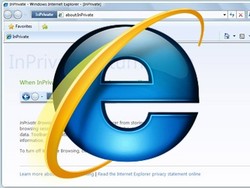Exclusive interview: Microsoft talks IE8
The complete Internet Explorer discussion

TR: IE8 is a step change for Internet Explorer, how much of that change has been fed by the changes made by your competitors?
JC: This is always going to be a competitive marketplace, so fundamentally what we need to do is not focus on the competition but to focus on what our customers want and focus on consumers to make sure they are having a great experience.
Of course everyone is aware of the features [of competitors] it's hard to hide them! Anyone can download anyone else's browser and have a look at it.
That said, it's really about driving development in a few key areas. We want to make the browser faster – performance is important and we've taken that very seriously in IE8. In the past we've gotten feedback on [speed] and it's something we took very seriously. We've just pushed out side by side comparisons.
There are lots of tests out there today in terms of how people look at speed and performance; what we tried to do was to say how do I use the web and what are people's daily experiences?
And fundamentally what we've seen is optimising Internet Explorer for those sections' experiences. And so we've got, for me, when I look at that test, fundamentally speed of performance in terms of rendering and bringing up pages – which was tested against top 25 sites worldwide – all three of the top browsers are essentially at parity.
There are marginal fractions of a second difference, but for most of them you have to use stop motion pictures to capture when it renders. I think performance is important but what you have to do is in a real world setting from a consumer's point of view and ask 'is this going to make a difference?' You're talking a fraction of a second – and we might have won 48 per cent of the time, but we're on a par.
Sign up for breaking news, reviews, opinion, top tech deals, and more.
People won't see that thousandths of a second, what they are going to see is how far the browser is going to enable them to do the things that they want to do. Performance is a table stakes. Everyone has to get to a basic benchmark level and assuming everyone's there then it's about how do you enable people to accomplish what they actually wanted to accomplish?
It's not a browser for browser's sake – it's a browser to go and do the thing I wanted whether it's be entertained or get information, and that's where IE8 shines.
Fundamentally what we've done with WebSlices and accelerators and those types of innovations is to really change how people use and interact with the browser.
What you do see in our extensive research, through people opting in as well as focus group studies and usability tests, is what people do most frequently. We've optimised the browser to really do those things well.

Patrick Goss is the ex-Editor in Chief of TechRadar. Patrick was a passionate and experienced journalist, and he has been lucky enough to work on some of the finest online properties on the planet, building audiences everywhere and establishing himself at the forefront of digital content. After a long stint as the boss at TechRadar, Patrick has now moved on to a role with Apple, where he is the Managing Editor for the App Store in the UK.